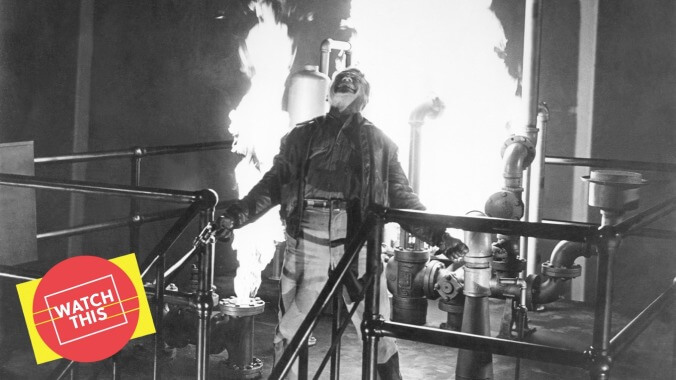James Cagney returned to gangster movies more psychotic than ever in White Heat

Watch This offers movie recommendations inspired by new releases, premieres, current events, or occasionally just our own inscrutable whims. This week: With the Russell Crowe road-rage thriller Unhinged racing (unwisely) into theaters, we’re looking back on other films that cast movie stars as psychopaths.
White Heat (1949)
When James Cagney played bugged-out gangster Cody Jarrett in the 1949 crime picture White Heat, it wasn’t exactly a change of pace for an actor who rose to prominence in charismatic tough-guy roles. But Cagney had spent much of the preceding decade doing musicals and war movies to combat his criminal typecasting, and he went hard for his return to the wrong side of the law. Cody Jarrett is a full-on maniac, in shark-like perpetual motion. He snaps at his flunkies for saying almost anything—after one warns him about an approaching storm, Jarrett changes their plans accordingly, then decks the guy for running the car radio too often—and indulges his hair-trigger temper with an actual trigger. At one point, he falls to the floor in an agonized spasm of headache pain, and still manages to fire off a gunshot while doing so.
Jarrett’s headaches are explained as a childhood ploy for attention that became real in adulthood, part of a “psychopathic devotion” to his mother (Margaret Wycherly). The hardened, doting, and fully complicit Ma Jarrett tags along with Cody’s gang; he doesn’t fully trust anyone else, including his long-suffering wife, Verna (Virginia Mayo). This maternal fixation filtered through Cagney’s magnetism makes Jarrett an occasionally pitiable form of psycho, even though he remains gloriously devoid of sympathetic motivations on the whole.
White Heat doesn’t have time to beg for sympathy; it’s too busy charting a twisty, fast-paced route through different crime subgenres. The film starts from a punchy, violent train robbery and subsequently hits on elements of a chase thriller, a prison movie, and a psychological drama on the way to a literally explosive finale (cue the film’s most famous line). Despite his quickness to anger, Jarrett is surprisingly cool-headed about the prospect of getting caught. As the feds close in on him for that opening train robbery and attendant murders—crimes that could send him to the gas chamber—he strategically turns himself in and confesses to a lesser crime in another state, taking a shorter prison sentence and an alibi over a harsher fate. The feds send in undercover agent Hank Fallon (Edmond O’Brien) in an attempt to tie him to other crimes.
Attention to the shoe-leather procedure of the stolid, largely featureless good guys pursuing Jarrett (especially a then-high-tech tailing system, now fascinating for its cumbersome mechanics) eventually steals some focus from Cagney’s acting—to the extent that’s possible, anyway. If the movie’s treatment of Jarrett’s mental illness is borderline cartoony, the stocky, relentless Cagney plays his mania with such pugnacious energy that it’s seamlessly integrated into the pulpy texture of White Heat. It’s a tremendous physical performance: Marvel at the momentum he generates during a scene where he punches his way through a series of prison guards after receiving particularly traumatizing news. Lots of stars garner attention for the novelty of going full psycho after a career of more ingratiating roles; it’s rarer for an actor to cement their star reputation because of the psychotic stuff. Cagney had great versatility, but when he flew into violent rages on screen, he was on top of the world.
Availability: White Heat is available to rent or purchase from Amazon, Google Play, iTunes, YouTube, Microsoft, Fandango, DirectTV, and VUDU . It’s also currently streaming on the subscription service IndieFlix, and for free (with ads) on an action-movie channel on Roku.